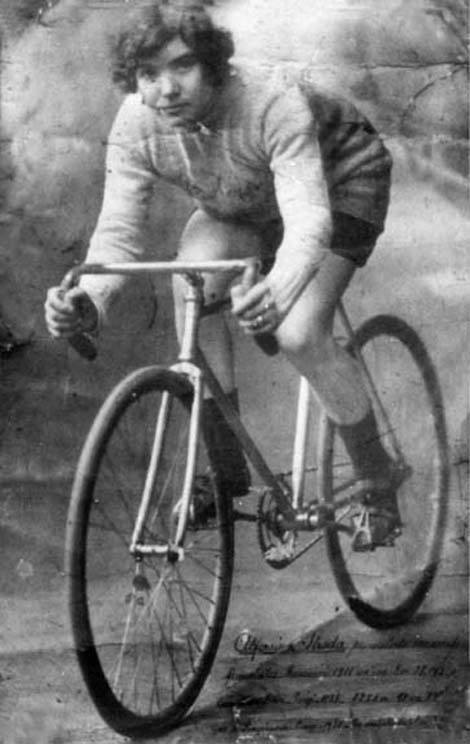Though today’s major European stage races like the Giro d’Italia and the Tour de France are about as difficult as any form of bike racing, their early incarnations were brutal beasts in ways the modern races are not. Racers would set out for 300km stages over unpaved roads on single speed bikes with little if any organized support along the way. Winning was as much about surviving as anything and the winner would often finish hours ahead of the lanterne rouge. Simply completing these races was an impressive feat. To do so as the only woman in history to race in any of the three Grand Tours elevates Alfonsina Strada to “serious bad ass” status.
Adventure Journal posted a link to the Wikipedia entry on Strada last week. She was a dedicated racer in early 20th-century Italy known for winning nearly every race she entered against women and many of those against men. Her reputation once earned her an invitation to race the Russian Grand Prix. Thanks to some clerical slight-of-hand, Strada was able to enter to enter the 1924 Giro d’Italia.
From Wikipedia:
Strada’s ride in the Giro d’Italia came about through a disagreement between the organiser, Emilio Colombo of Gazzetta dello Sport, and the top riders of the day. The riders refused to take part. Colombo did what the Tour de France had done and offered places to whoever wanted to ride. Gazzetta dello Sport promised to pay their bills, their hotels and their food. It offered places for 90 riders and promised 600 chickens, 750 kg of other meat, 4,800 bananas and 720 eggs. But there would be no managers, no masseurs, no mechanics and no team cars.
Strada entered as “Strada, Alfonsin.†The absence of a final “o†or “a†to her first name hid whether she was a man or a woman. She was accepted as number 72 and, assuming her to be a man, journalists began writing of Alfonsino. The truth emerged the day before the start and by then it was too late.
She came 74th on the first day, an hour behind the leader but nothing by the standard of the day, when riders could be separated by hours. She finished 50th of 65 between Genoa and Florence and survived as far as Naples. Then the weather turned. A gale blew, rain poured, mud and rocks swept across the road. Strada was among many who crashed. Her handlebars snapped and she stood by the roadside until a peasant snapped a broomstick to jam in the hole. She rode on with one side of her bars of steel and the other of broomstick but finished outside the time limit.
Radio Marconi said:
“The Foggia-L’Aquila — 7th stage was 304km, which was bad enough because the southern Italian roads at this time were nearly impassable. They were not paved, and were rocky and icy too. The mountain pass was so terrible that the riders could not get their bikes through the mire and mess on their own and almost all the participants were towed part way by motorcycles and cars. Alfonsina suffered terribly on this stage. She fell on a descent and had to ride many more hours using her bruised, scraped and swollen knee.â€
The race referees excluded her because she was out of time. The organizer, Colombo, couldn’t stop them from applying his own rules but by then spectators were waiting to see her and her rides were producing stories for his reporters. Some reports say that Colombo had to balance sentiment, commercial benefit, the political climate and Italian fascism’s intolerance of her challenge to machismo. He let her ride on as an individual, paying her bills but excluding her from prizes.
The next day was to Fiume, where a crowd lifted her from her bicycle and carried her in triumph when she finished in tears from pain and exhaustion 25 minutes after the time limit. It motivated her to continue to Milan. Only 38 completed the race and Strada, although no longer formally in the running, finished more than 20 hours ahead of Telesforo Benaglia, the lanterne rouge. She finished 28 hours behind the winner, 30-year-old Giuseppe Enrici of Piedmont. But almost an hour separated Enrici from his runner-up, Federico Gay, so it was hardly a close-run race. And two riders finished behind her.

